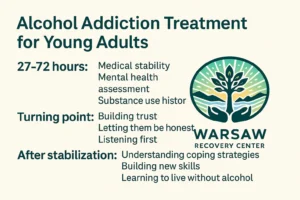It’s 2 a.m. and your phone rings.
Maybe they’re crying. Maybe they’re silent. Maybe they’re not calling at all—but you’re wide awake, replaying every moment that led to this. The drinking. The lies. The changes in personality. The gut feeling that something is deeply wrong.
If you’re here, you’re probably scared, exhausted, and unsure of what happens next. You may not even know what to call what your child is going through. But one thing is clear: something has to change.
At Warsaw Recovery Center, we help parents just like you understand how alcohol addiction treatment works—especially when it feels like your young adult is unraveling before your eyes. This blog explains how clinical support helps young people stabilize, what “stabilize” actually means, and where hope lives inside this chaos.
To learn more about what treatment includes, you can visit our alcohol addiction treatment program in Warsaw, Virginia.
Stabilization is the first step—but it’s a big one
When we talk about stabilization, we’re talking about helping your child become safe—physically, emotionally, and psychologically—so they can begin the real work of healing.
For some young adults, that means:
- Sleeping through the night for the first time in weeks
- Eating a full meal that stays down
- Coming down from panic, agitation, or withdrawal symptoms
- Feeling something other than shame, anger, or numbness
It’s not instant. But it’s real. Stabilization doesn’t “fix” them—but it gives them a fighting chance. And that’s everything.
Clinical teams work behind the scenes of the crisis
When a young adult enters alcohol addiction treatment, they often can’t explain what they’re feeling. They might be defensive, checked out, even angry about being there.
Our job as clinicians is to see past that and assess what’s really going on.
In the first 24–72 hours, our team focuses on:
- Medical stability: Are they withdrawing? Are they at risk physically?
- Mental health assessment: Are we dealing with anxiety, depression, trauma, or more?
- Substance use history: What are they drinking, how often, and why?
- Support needs: What do they need right now to feel safe?
We don’t just look at the drinking. We look at what the drinking is doing for them—and what it’s doing to them.
Connection, not confrontation, is the turning point
If you’ve tried to talk to your child and hit a wall, that’s not failure. That’s what addiction—and fear—do.
What works in a clinical setting is something different: relational safety. That means:
- Building trust before asking for change
- Letting them be honest without being punished
- Listening first, guiding second
We’ve seen young adults go from hostile and shut down to vulnerable and open—not because we pushed, but because we gave them space to be seen without being judged.
Alcohol isn’t the problem—it’s the symptom
For many young adults, alcohol is the only thing that numbs what they’re feeling—or helps them feel anything at all.
That’s why, after stabilization, treatment focuses on helping them understand:
- Why alcohol became their coping strategy
- What emotions or experiences feel intolerable without it
- How to build new skills for distress, boredom, or social pressure
This is the real work of alcohol addiction treatment—not just stopping drinking, but learning to live without needing to escape.
At Warsaw Recovery Center, we use evidence-based therapies to help your child build those skills—one small, sustainable step at a time.
Your child needs you—but not as their rescuer
As a parent, you’ve likely tried everything. Curfews. Boundaries. Helping. Hiding. Hoping. Maybe even ultimatums.
But once they enter treatment, your role shifts. You are still critical—but not as the fixer.
Here’s what you can do:
- Participate in family therapy if offered
- Practice consistent boundaries (with support from the clinical team)
- Take care of your nervous system, too
- Ask questions instead of assuming the role of expert
Let the professionals guide the treatment so you can focus on healing the relationship—not managing the crisis.
Recovery is built one choice at a time
You may want a guarantee. A timeline. A clear finish line.
But recovery doesn’t work like that. Stabilization opens the door. The walk through it is made of daily decisions, discomfort, and honest work.
The good news? We see this process work every day:
- Students return to college with a plan.
- Young adults repair broken trust with family.
- People who were drowning in addiction learn how to come up for air—and stay there.
That future may feel far off today. But it starts here.
Our alcohol addiction program in Virginia supports that full journey—from stabilization to long-term recovery.
FAQs About Alcohol Addiction Treatment for Young Adults
How do I know if my child really needs treatment?
If their drinking is affecting their mental health, relationships, safety, school, or daily functioning—it’s worth a professional assessment. It doesn’t have to look like rock bottom to be serious.
What if they don’t think they have a problem?
Denial is common, especially in younger adults. Clinicians are trained to meet people where they are—not where we want them to be. Treatment can still help even if they’re not “ready” in the way you’d hope.
Can we afford treatment? What are the options?
Our admissions team helps families navigate insurance, payment plans, and referrals. Don’t assume it’s out of reach—many treatment programs, including ours, offer support with logistics.
Will they fall behind in school or work?
Treatment may require time off—but many programs offer academic or vocational support. The short break now can prevent long-term consequences later.
What happens after stabilization?
Your child may continue into residential care, outpatient programming, or transitional support like sober living or therapy. We build an individualized plan based on their needs, goals, and risk factors.
What We Wish Every Parent Knew
You didn’t cause this.
You can’t control it.
But you can be a steady presence in the storm. You can advocate for care without carrying the weight of recovery on your back. You can take the first brave step—by asking for help instead of answers.
Your child is still in there. And so are you.
Let us help you both find your footing again.
Feeling overwhelmed but ready for answers?
Call (888) 511-9480 or visit our alcohol addiction treatment page to learn how we help young adults stabilize safely and begin the path to recovery. You’re not alone—and neither are they.


